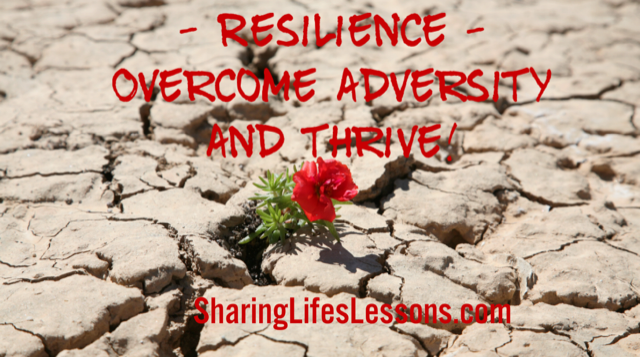Resilience – Key to Overcoming Adversity and Thriving in Life
- 06
- March
- 2024

How resilient are you? We’ve been thinking about all that has gone on in the world in the last few years and is still going on today. That got us reflecting about our parents and ancestors. They definitely were role models for resilience in overcoming adversity and thriving.
Resilience is a term that’s often used in psychology to describe the ability to bounce back from difficult experiences and maintain normal functioning. It’s a crucial trait that helps us navigate the challenges and setbacks we encounter in life, whether they’re minor or major. Today, we’ll explore what resilience is, types of resilience, why it’s important, and how we can develop it.
What is Resilience?
Resilience is the ability to adapt well in the face of adversity, trauma, tragedy, threats, or significant sources of stress. It involves “bouncing back” from difficult experiences and maintaining a positive outlook. Resilient people are able to cope with stress effectively and use challenges as opportunities for growth and self-discovery.
Resilience is not a fixed trait that people either have or don’t have. The good news is that resilience is a set of skills and behaviors that can be learned and developed over time.
Resilient people tend to have a positive life view of themselves, trust their abilities, and are able to tap into their social support networks.
What are the Types of Resilience?
There are several types of resilience including emotional, motivational, spiritual, and physical. Emotional resilience helps people regulate internal states and externalize those emotions properly. Motivational resilience drives people to pursue their goals with positivity despite hurdles. Spiritual resilience allows people to draw strength from faith to withstand suffering. Physical resilience means having stamina to tolerate physical distress.
Why is Resilience Important?
Resilience is important because it enables us to cope with life’s inevitable challenges and setbacks. It helps us to maintain our mental and physical health, to perform at our best, and to live a fulfilling and meaningful life.
People who are resilient can handle stress and adversity more effectively than those who are not resilient. Because they’re able to manage their emotions, they stay focused, persist in the face of obstacles, and reach their goals.
How Can We Develop Resilience?
Here are some tips for developing resilience:
- Build positive beliefs in your abilities: Believe in your strengths and accomplishments to cope with challenges and setbacks to reach your goals.
- Develop realistic goals: Set goals that are achievable and that are aligned with your values and interests.
- Practice positive self-talk: Talk to yourself in a supportive and encouraging way.
- Manage your emotions effectively: Practice relaxation techniques, mindfulness, to manage your emotions.
- Maintain a positive social network: Surround yourself with supportive and positive people who believe in you and your abilities.
- Engage in meaningful activities: Engage in activities that give you a sense of purpose, meaning, and accomplishment.
- Seek professional help when needed: Seek help from a mental health professional, coach or spiritual leader if you’re struggling to cope with stress or adversity.
Resilient individuals are often viewed as role models. Helen Keller epitomized resilience, living productively despite being deaf and blind. She famously stated, “Although the world is full of suffering, it is also full of the overcoming of it.” Even in her hardship, Keller found meaning and persevered.
Holocaust survivor Viktor Frankl embodied resilience by surviving Nazi death camps and finding purpose through the ordeal. As he once wrote, “Everything can be taken from a man but one thing: the last of the human freedoms – to choose one’s attitude in any given set of circumstances.” His memoir ‘Man’s Search for Meaning’ chronicles how resilience propelled his survival and ethical development in the camps.
What role models do you have for resilience? Resilient role models prove that hardship often includes opportunities for growth and positive impact. With resilience, people can turn vulnerabilities into strengths to lead more fulfilling lives aligned with their highest values and aspirations.
What about you? How resilient are you? As we stated, resilience is a crucial trait that enables us to overcome adversity and thrive in life. It’s not a fixed trait, but rather a set of skills and behaviors that can be learned and developed over time.
If you want to develop more resilience, we encourage you to use the tips we’ve suggested. Also, look at what you’ve learned from the role models in your life. Then you’ll be even more able to turn your stumbling blocks into stepping stones by overcoming adversity and thriving in life.
Chanhassen MN residents, Doug and Lynn Nodland are success coaches and owners of The Balance Center in Excelsior. Contact them at WeCare@TheBalanceCenter.com
© Doug and Lynn Nodland 2024 Articles and videos may be shared in their entirety with attribution.
Search:
Categories
Archives
- April 2024
- March 2024
- February 2024
- January 2024
- December 2023
- November 2023
- October 2023
- September 2023
- August 2023
- July 2023
- June 2023
- May 2023
- April 2023
- March 2023
- May 2021
- April 2021
- March 2021
- February 2021
- January 2021
- December 2020
- November 2020
- October 2020
- September 2020
- August 2020
- July 2020
- June 2020
- May 2020
- April 2020
- March 2020
- February 2020
- January 2020
- December 2019
- November 2019
Contact Us
Doug Nodland J.D.
684 Excelsior Boulevard
Suite 120
Excelsior, MN 55331
952-452-2664
WeCare@TheBalanceCenter.com

